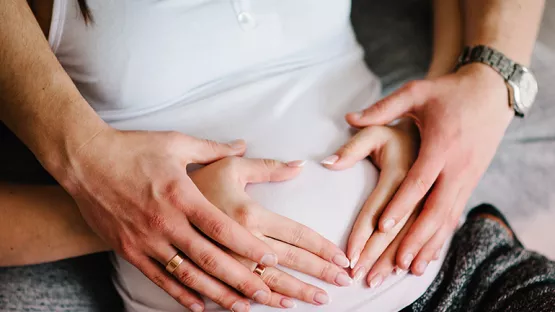What is Maternal Milk & Why the Origin is Important
Mums-to-be need milk/susu too. Now it’s time to learn goes into making.... read more

Pregnancy is calculated from the first day of your last menstrual period (LMP). In week 1, your body is preparing for ovulation and the implantation of a fertilised egg. If the egg is fertilised, it will implant in the lining of your uterus about 6-12 days after ovulation. You may not experience any pregnancy symptoms in week 1, but some women may notice light spotting, breast tenderness, or fatigue. If you are preparing for pregnancy and are curious about what you can do to ease your body into the process, read our week 1 of pregnancy guide to learn more.
Some women are lucky enough to know their bundle of joy’s exact conception date. However, that is more of an exception rather than the norm. In the weeks that follow, an ultrasound will give you a better idea of your embryo’s age.
While your body is adjusting itself to accommodate a new life in week 1, week 2 is when you are likely to be approaching ovulation. This is when you are most likely to conceive. You will not experience any pregnancy symptoms just yet. Instead, watch out for signs of this fertile period. These signs include:
As your body prepares for ovulation, it gets ready for any potential sperm. Your cervical mucus increases and changes. It starts to look like “egg-white” – clear, thin, and stringy. This helps the sperm to travel up to the cervix and egg more easily.
Some women feel a slight discomfort in their abdomen when their body releases an egg.
As the egg ruptures, the follicle bursts into the fallopian tube. When this happens, you might see some light spotting.
Due to the hormonal changes that trigger ovulation, some women notice a heightened sense of smell. You could become more sensitive to musky scents and male pheromones. That is nature’s way of encouraging reproduction.
Some women have sore breasts as they approach ovulation.
The hormones associated with ovulation are said to be responsible for increasing your desire to have intercourse.
During the early days of pregnancy, there is still no foetus yet.1 Conception might not happen on the same day of your ovulation. Doctors count your pregnancy weeks from the first day of your last menstrual period. So, by the time you find out that you’re pregnant, you could be around 4 to 6 weeks pregnant - even if there was no foetus during the first two weeks.
On week 2 of your pregnancy, one egg becomes dominant and it releases oestrogen to stimulate the thickening of your uterine lining. Once your oestrogen levels are high enough, they trigger a surge of luteinising hormone (LH). This hormone causes the mature egg to burst from its follicle and into the fallopian tube. However, an unfertilised egg can only survive for about 24 hours after being released.
You are unlikely to experience any pregnancy symptoms from day 1. Some symptoms of ovulation, like breast tenderness, are identical to pregnancy symptoms during the first few days of pregnancy.
These are some of the things you can do during week 2 of pregnancy:
The changes in your cervical mucus are usually a tell-tale sign that your ovulation is coming.
A home ovulation test can measure certain hormones and advise on when it’s time to try for a child.
An app can provide lots of useful information. By the end of your second week of pregnancy, a menstrual calendar will be able to determine your fertile days and advise when to have intercourse.
Ideally, take prenatal supplements when you start trying to conceive. This can boost your fertility, and prevent neural tube defects.
Your body is in full preparation mode for pregnancy during the second week of pregnancy. However, it’s unlikely to need an ultrasound at the second week of pregnancy unless your doctor is concerned you might not be ovulating. On average, it takes a fertilised egg about 6 to 10 days to travel from the Fallopian tube to your uterus. When implantation has occurred in the uterus, pregnancy has officially happened. Take care of your nutrition needs with milk formulated for pregnancy, like Frisomum Gold® to help your body prepare.
While week 2 mainly focuses on the implantation of the embryo, week 3 of pregnancy is a time of rapid growth and development. The embryo is now about the size of a vanilla bean and has two layers of cells: the inner cell mass, which will develop to form your child, and the trophoblast, which will become the placenta.2
Some women may start to experience pregnancy symptoms in week 3, such as fatigue, nausea, cramping, bloating and breast tenderness.3 If you’re experiencing nausea, you can try eating small, frequent bland meals to help cope with it.4 Additionally, you can also consider eating more foods that contain ginger or drinking chamomile tea to quell the queasiness.4 However, it is also common to not show any pregnancy signs or symptoms at this stage. If you’re curious to learn more about how to make the process an easy and smooth one, check out our week 3 of pregnancy article to better understand the changes that you and your child will be going through.
As this stage is crucial for your child’s development, it’s important to nourish your body with the essential nutrients it needs for optimal foetal growth. Frisomum® Gold will be a great addition to a healthy diet as it consists of essential nutrients such as vitamin B12, folic acid, iodine, vitamin D and calcium which are formulated with DualCare+™, to support mums’ and her child’s needs. It also has a low glycemic index to help you stick to a healthy weight during pregnancy.
Throughout the process of pregnancy, your body will undergo many changes, so be kind to yourself and take things easy. It’s also a great idea to start building a support group for your journey ahead.
References


